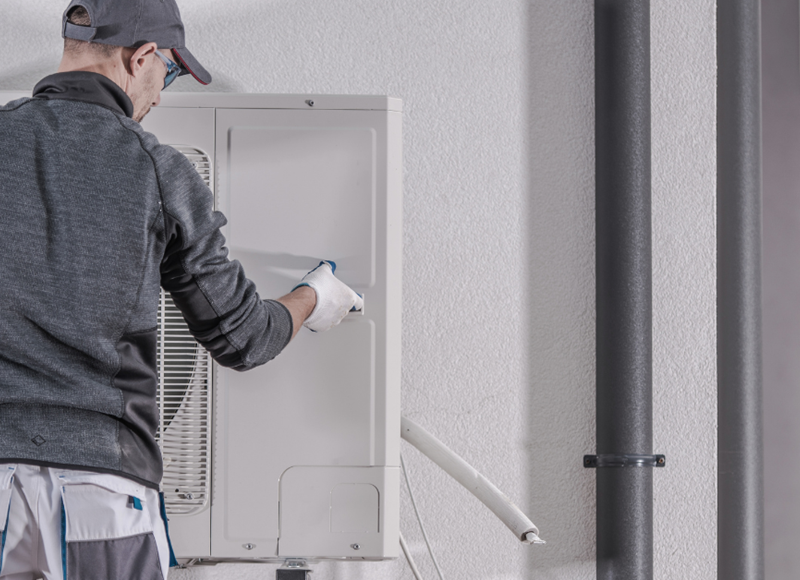Underfloor heating

Underfloor heating can be used to warm your floor or act as a primary heat source, replacing your radiators. It comes in 2 main forms, electric systems and water systems.
-
Wall space
You won't need any. It doesn’t take up wall space or dictate where you can put furniture – and it's not on show, unlike radiators!
-
100% Efficient
This means every £1 you spend on electricity will give you £1 worth of heat for your home. A new gas or oil boiler will always be less than 100% efficient and will become even less efficient as they age.
-
Zero harmful emissions
Electric underfloor heating generates no harmful emissions from a property, meaning the air both inside and outside of your home is cleaner. And as over 90% of Guernsey’s electricity is imported renewable energy, it is more environmentally friendly from start to finish.

This type of heating can be used to warm a floor area or become your main heat source by replacing radiators. Underfloor comes as a 'dry' electric system, or a 'wet' water system.
- Electric dry systems use electric cables either buried in screed or laid in an air space under the floor to generate heat.
- A wet water system will use an electric flow boiler to pump heated water through pipes set in your floor to heat the space in your room.
The best floor surfaces to pair underfloor heating with are tile, wood, stone, laminate and vinyl as these conduct heat well.

And the better insulated your property, the less you will spend heating it.
When you book a home visit with us, one of our advisors will calculate your unique home heat loss and provide you with a quotation based on your property’s needs. This will indicate the specification your new underfloor heating system needs to be, to replace the heat that will be lost.
Dry underfloor heating uses special electric cables buried in screen or self-levelling latex which when switched on, will generate the heat you need.
Wet underfloor heating needs a specialist plastic piping buried in screed. Your electric flow boiler will circulate hot water through these pipes to provide heat.

If you plan to have a wet underfloor heating system, you may need a smaller electric boiler than your current oil or gas boiler.
You will only ever need to replace the actual heat that your property loses. A heat loss calculation will tell your installer how large the boiler for your property needs to be. It might be that you have a well-insulated home that doesn’t need to replace as much heat as another property of similar size.
A larger boiler will not benefit you in any way, and could even make your underfloor heating system less efficient.
Don’t wait for your boiler to break midwinter to make the change.
Spring and Summer are the best time to make the switch. As with a house extension or roof replacement, it takes time but is worthwhile.

Power Supply
It’s really important to plan ahead and check if your property needs a supply line cable upgrade.
Electricity is delivered to your door through an underground network of cables. Some properties don’t have enough capacity in the existing service cable to supply a new heating system ad will need a service upgrade.
Your installer can check with Guernsey Electricity by submitting an additional load application if your property needs a supply line cable upgrade
-
 Dry underfloor heatingElectric dry underfloor heating uses special electric cables buried in screen or self-levelling latex which when switched on, will generate the heat you need.
Dry underfloor heatingElectric dry underfloor heating uses special electric cables buried in screen or self-levelling latex which when switched on, will generate the heat you need. -
 Wet Underfloor HeatingThis will need a specialist plastic piping buried in screed. Your electric flow boiler will circulate hot water through these buried pipes to provide heat.
Wet Underfloor HeatingThis will need a specialist plastic piping buried in screed. Your electric flow boiler will circulate hot water through these buried pipes to provide heat.
Frequently asked questions
Making the switch to electric heating is a fantastic investment for your property. Like any property upgrade, the installation will take time to complete and we want to help answer your questions before you make the decision to change.
No - unless you are replacing an existing electric heating system. However, your preferred installer will always do their best to provide a solution in an emergency.
Switching to an electric system is a positive development for your property and similar to other property improvements such as extensions and roof renovations, it will take time to complete.
Lead times will vary depending on workload and availability, and it is worth preparing for your switch to electric heating well in advance. Please be aware that your property may need a supply line cable upgrade which will add to the timeframe.
We also recommend switching during the spring and summer months when possible so the work can be carried out when you do not need to use the heating. Depending on the work required, it may take several weeks from start to finish.
We recommend checking current prices and tariffs online first.
Use our online calculator to compare heating running costs
Heating systems only replace the volume of heat lost from your property, which means property insulation is the most effective way to reduce the running costs of any heating system.
Off-Peak Storage Heating
This heating system runs on the cheapest tariff available for electric heating as, like a battery, they're designed to store heat energy during your low-rate overnight periods. This cheaper stored heat can then be used during the day as and when you need it.
Please check our Super Economy 12 'Low-Rate' prices here. Your low-rate time bands are printed on the back of your electricity bill.
Electric Boilers and Underfloor Heating
These run on the Superheat Tariff.
Electric heating is costs significantly less to run than gas heating in Guernsey.
Oil is one of the cheapest commodities and although oil heating systems may initially have a lower running cost when new at around 91% efficiency, over time the cost to run your oil heating will increase as your boiler's efficiency decreases.
Some customers have replaced oil boilers working at less than 70% efficiency, meaning over 30% of their bill was used to pay for waste greenhouse gas emissions rather than valuable heat for their home.
Air Source Heat Pumps
This is the least expensive way to heat a property and runs on the Heat Pump tariff.
Unlike other heating systems, air source heat pumps provide three times as much energy as is put in. This means that for every £1 spent on electricity to run the heat pump, you could generate £3 worth of heat for your property.
If you’d like to make the switch to electric heating but are unsure about the upfront cost, you may be able to receive a preferential rate from lenders who offer "green lending".
Your best option would be to get in touch with your preferred lender and enquire about discounted loans based on purchasing an electric heating system as an alternative to gas or oil.
A header tank is used to supply water to the central heating system. It will maintain the level of water needed as the water expands when heated.
A new electric boiler needs a pressurised system and therefore won't need a header tank. If you have an existing gravity-fed hot water cylinder, this should be changed to a pressurised system at the same time as a boiler install. This will mean your header tank becomes redundant.
If the supply line cable supplying your property has sufficient capacity, you will not need an upgrade. However to find this out, your installer will need to submit an 'additional load' application.









